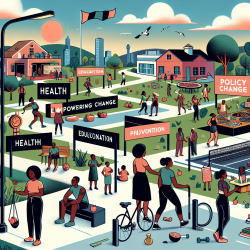Understanding the Complexities of Myanmar Migrants' Lives: Insights for Practitioners
The recent study titled "Myanmar migrants living along the Thailand-Myanmar border: Experiences related to pandemic and migration decisions" provides a compelling look into the lives of Myanmar migrants. This research, conducted by Chen et al. (2024), sheds light on the multifaceted challenges faced by these individuals, particularly during the COVID-19 pandemic. As practitioners, understanding these challenges is crucial for improving outcomes for migrant populations.
Key Findings from the Research
The study identified three primary themes that encapsulate the experiences of Myanmar migrants:
- Issues Related to the Pandemic: The pandemic significantly impacted the behavior of children, leading to changes that affected their education and social interactions. The quality of education diminished, and barriers to accessing COVID-19 vaccines and healthcare services were prevalent.
- Teenage Marriage and Pregnancy: The pandemic exacerbated the rate of teenage marriages and pregnancies, contributing to increased school dropout rates. This issue highlights the need for targeted interventions in sexual health education and support for young individuals.
- Migration Decisions: Health concerns, civil unrest, and military harassment were pivotal in migration decisions. These factors underline the urgent need for international humanitarian interventions to ensure access to necessary healthcare and education for migrants.
Implications for Practitioners
Practitioners working with migrant populations can draw several actionable insights from this study:
- Focus on Mental Health: The study highlights the psychological toll of migration stress and the importance of mental health support. Practitioners should prioritize mental health services and create safe spaces for migrants to express their concerns.
- Enhance Education Quality: Addressing the diminished quality of education during the pandemic is crucial. Practitioners can collaborate with educational institutions to develop programs that accommodate the unique needs of migrant children.
- Address Teenage Marriage and Pregnancy: Implementing comprehensive sexual health education and providing support for young parents can help mitigate the impact of teenage marriages and pregnancies.
Encouraging Further Research
While this study provides valuable insights, there is a need for further research to explore the long-term effects of migration stress and the effectiveness of interventions. Practitioners are encouraged to contribute to this body of knowledge by conducting studies that focus on the unique challenges faced by migrant populations in different contexts.
To read the original research paper, please follow this link: Myanmar migrants living along the Thailand-Myanmar border: Experiences related to pandemic and migration decisions.










